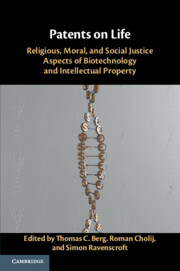 Patents on Life
Patents on Life Book contents
- Patents on Life
- Patents on Life
- Copyright page
- Contents
- Contributors
- Prefatory Note and Acknowledgements
- Opening
- I Life Patents, Law, and Morality
- II Religious Perspectives on Life Patents
- 5 Intellectual Property Rights and the Fundamental Right to the Commons in the Light of Catholic Social Teaching
- 6 Human Rights and Life Patents: Lessons from the Church’s Social Teaching and Engagement in the United States
- 7 Intellectual Property and Genetic Sequences: A Jewish Law Perspective
- 8 Intellectual Property, Islamic Values, and the Patenting of Genes
- 9 Christian Libertarianism and the Curious Lack of Religious Objections to the Patenting of Life Forms in the United States
- 10 From Chakrabarty to Myriad and Beyond: Catholic Contributions to the Gene-Patenting Debate
- III Social Justice and Political Aspects
- Closing
- Index
5 - Intellectual Property Rights and the Fundamental Right to the Commons in the Light of Catholic Social Teaching
from II - Religious Perspectives on Life Patents
Published online by Cambridge University Press: 28 September 2019
- Patents on Life
- Patents on Life
- Copyright page
- Contents
- Contributors
- Prefatory Note and Acknowledgements
- Opening
- I Life Patents, Law, and Morality
- II Religious Perspectives on Life Patents
- 5 Intellectual Property Rights and the Fundamental Right to the Commons in the Light of Catholic Social Teaching
- 6 Human Rights and Life Patents: Lessons from the Church’s Social Teaching and Engagement in the United States
- 7 Intellectual Property and Genetic Sequences: A Jewish Law Perspective
- 8 Intellectual Property, Islamic Values, and the Patenting of Genes
- 9 Christian Libertarianism and the Curious Lack of Religious Objections to the Patenting of Life Forms in the United States
- 10 From Chakrabarty to Myriad and Beyond: Catholic Contributions to the Gene-Patenting Debate
- III Social Justice and Political Aspects
- Closing
- Index
Summary
In the early 2000s the Holy See submitted papers to the WIPO and the WTO, on the subject of Intellectual Property (IP) rights, genetic resources, traditional knowledge, and access to medicines. This chapter develops some concepts that are mainly implicit in those papers. Catholic Social Teaching does not address directly the subject of IP rights, but contains all the elements for a moral judgment on the present system of IP rights. The chapter develops the discussion in three parts: first, some ideas about private property and the universal destination of goods, and the right to knowledge; second, proposing a vision of IP rights in the light of the aforesaid principles about property in Catholic Social Teaching; third, examining the issue of IP rights in relation to the rights of native peoples. The essay concludes by arguing that, to ensure that patents serve the universal destination of goods and the common good, a new legal theory should be developed in this area. This would reconsider, especially, rules relating to the public availability of the invention, the right price of the licenses, possible exceptions to the patent, means of technological transfer, and the creation of alternative means of industrial knowledge protection.
Keywords
- Type
- Chapter
- Information
- Patents on LifeReligious, Moral, and Social Justice Aspects of Biotechnology and Intellectual Property, pp. 85 - 99Publisher: Cambridge University PressPrint publication year: 2019


